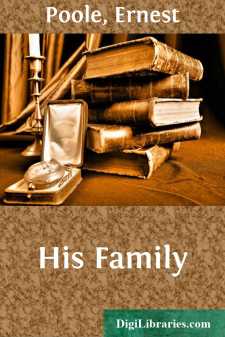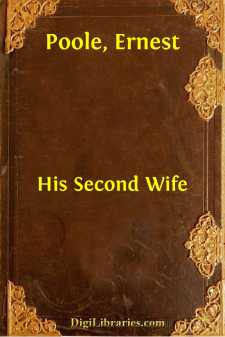Categories
- Antiques & Collectibles 13
- Architecture 36
- Art 48
- Bibles 22
- Biography & Autobiography 813
- Body, Mind & Spirit 142
- Business & Economics 28
- Children's Books 14
- Children's Fiction 11
- Computers 4
- Cooking 94
- Crafts & Hobbies 4
- Drama 346
- Education 46
- Family & Relationships 57
- Fiction 11829
- Games 19
- Gardening 17
- Health & Fitness 34
- History 1377
- House & Home 1
- Humor 147
- Juvenile Fiction 1873
- Juvenile Nonfiction 202
- Language Arts & Disciplines 88
- Law 16
- Literary Collections 686
- Literary Criticism 179
- Mathematics 13
- Medical 41
- Music 40
- Nature 179
- Non-Classifiable 1768
- Performing Arts 7
- Periodicals 1453
- Philosophy 64
- Photography 2
- Poetry 896
- Political Science 203
- Psychology 42
- Reference 154
- Religion 513
- Science 126
- Self-Help 84
- Social Science 81
- Sports & Recreation 34
- Study Aids 3
- Technology & Engineering 59
- Transportation 23
- Travel 463
- True Crime 29
His Family
by: Ernest Poole
Categories:
Description:
Excerpt
CHAPTER I
He was thinking of the town he had known. Not of old New York—he had heard of that from old, old men when he himself had still been young and had smiled at their garrulity. He was thinking of a young New York, the mighty throbbing city to which he had come long ago as a lad from the New Hampshire mountains. A place of turbulent thoroughfares, of shouting drivers, hurrying crowds, the crack of whips and the clatter of wheels; an uproarious, thrilling town of enterprise, adventure, youth; a city of pulsing energies, the center of a boundless land; a port of commerce with all the world, of stately ships with snowy sails; a fascinating pleasure town, with throngs of eager travellers hurrying from the ferry boats and rolling off in hansom cabs to the huge hotels on Madison Square. A city where American faces were still to be seen upon all its streets, a cleaner and a kindlier town, with more courtesy in its life, less of the vulgar scramble. A city of houses, separate homes, of quiet streets with rustling trees, with people on the doorsteps upon warm summer evenings and groups of youngsters singing as they came trooping by in the dark. A place of music and romance. At the old opera house downtown, on those dazzling evenings when as a boy he had ushered there for the sake of hearing the music, how the rich joy of being alive, of being young, of being loved, had shone out of women's eyes. Shimmering satins, dainty gloves and little jewelled slippers, shapely arms and shoulders, vivacious movements, nods and smiles, swift glances, ripples, bursts of laughter, an exciting hum of voices. Then silence, sudden darkness—and music, and the curtain. The great wide curtain slowly rising....
But all that had passed away.
Roger Gale was a rugged heavy man not quite sixty years of age. His broad, massive features were already deeply furrowed, and there were two big flecks of white in his close-curling, grayish hair. He lived in a narrow red brick house down on the lower west side of the town, in a neighborhood swiftly changing. His wife was dead. He had no sons, but three grown daughters, of whom the oldest, Edith, had been married many years. Laura and Deborah lived at home, but they were both out this evening. It was Friday, Edith's evening, and as was her habit she had come from her apartment uptown to dine with her father and play chess. In the living room, a cheerful place, with its lamp light and its shadows, its old-fashioned high-back chairs, its sofa, its book cases, its low marble mantel with the gilt mirror overhead, they sat at a small oval table in front of a quiet fire of coals. And through the smoke of his cigar Roger watched his daughter.
Edith had four children, and was soon to have another. A small demure woman of thirty-five, with light soft hair and clear blue eyes and limbs softly rounded, the contour of her features was full with approaching maternity, but there was a decided firmness in the lines about her little mouth. As he watched her now, her father's eyes, deep set and gray and with signs of long years of suffering in them, displayed a grave whimsical wistfulness. For by the way she was playing the game he saw how old she thought him. Her play was slow and absent-minded, and there came long periods when she did not make a move. Then she would recall herself and look up with a little affectionate smile that showed she looked upon him as too heavy with his age to have noticed her small lapses.
He was grimly amused at her attitude, for he did not feel old at all. With that whimsical hint of a smile which had grown to be a part of him, he tried various moves on the board to see how far he could go without interrupting her reveries. He checkmated her, re-lit his cigar and waited until she should notice it. And when she did not notice, gravely he moved back his queen and let the game continue. How many hundreds of games, he thought, Edith must have played with him in the long years when his spirit was dead, for her now to take such chances. Nearly every Friday evening for nearly sixteen years.
Before that, Judith his wife had been here. It was then that the city had been young, for to Roger it had always seemed as though he were just beginning life. Into its joys and sorrows too he had groped his way as most of us do, and had never penetrated deep. But he had meant to, later on. When in his busy city days distractions had arisen, always he had promised himself that sooner or later he would return to this interest or passion, for the world still lay before him with its enthralling interests, its beauties and its pleasures, its tasks and all its puzzles, intricate and baffling, all some day to be explored....




